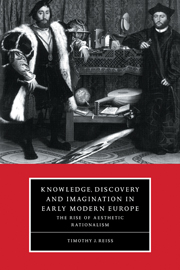Book contents
- Frontmatter
- Contents
- Prologue and acknowledgements
- A note on the text
- Introduction
- Part 1 Problematizing the language arts
- 1 Grammarians' dreams
- 2 Grammarians' nightmares
- Part 2 Passages
- Part 3 Mathematics, music and rational aesthetics
- Bibliography
- Index
- CAMBRIDGE STUDIES IN RENAISSANCE LITERATURE AND CULTURE
2 - Grammarians' nightmares
Published online by Cambridge University Press: 01 February 2010
- Frontmatter
- Contents
- Prologue and acknowledgements
- A note on the text
- Introduction
- Part 1 Problematizing the language arts
- 1 Grammarians' dreams
- 2 Grammarians' nightmares
- Part 2 Passages
- Part 3 Mathematics, music and rational aesthetics
- Bibliography
- Index
- CAMBRIDGE STUDIES IN RENAISSANCE LITERATURE AND CULTURE
Summary
I am reminded of an unusual text in a slightly later work by Tory's hero, Bovelles. He titled the penultimate chapter of his De vitiis vulgarium linguarum liber (in De differentia, 1533) ‘Ab arbitrio primi parentis Adae primam voluntate dei emanasse mundi linguam’ (‘By God's will, the world's first language issued from the decision of our first ancestor Adam’). He added that Adam's naming the animals showed us first how, by God's gift (‘munere dei’), Adam had the arbitrium voluntarily to establish a first tongue (‘primae totius mundi linguae voluntariae institutionis arbitrium’), and second, how God endowed humans with ‘libero arbitrio’. ‘ Marie-Rose Logan remarks of this passage that in ‘no other work paraphrasing Genesis does there seem to be a word so explicit as “arbitrium” used to designate Adam's gesture’. Well, yes and no. For Bovelles could in fact have found his terms, if not Adam's actual gesture, in a celebrated work by one of his teacher's Italian triumvirate.
Pico may not have been writing specifically of language, but he was undoubtedly paraphrasing Genesis at the start of his oration De hominis dignitate
- Type
- Chapter
- Information
- Knowledge, Discovery and Imagination in Early Modern EuropeThe Rise of Aesthetic Rationalism, pp. 45 - 70Publisher: Cambridge University PressPrint publication year: 1997

